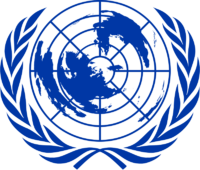TCN Resolution 027
Jump to navigation
Jump to search
| TCN General Assembly Resolution 027 | |
|---|---|
 | |
| Date | July 14, 2020 |
| Meeting no. | 20 |
| Code | G/RES/2020-16[1] |
| Subject | International justice |
Voting summary |
|
| Result | Approved |
TCN Security Council Resolution 027, officially called On the Subject of Terraconserva International Court Invocations (027), was adopted by the Terraconserva Council of Nations General Assembly on July 14, 2020.
Resolution
RESOLUTION #027
To the General Assembly of the Terraconserva Council of Nations
Sponsored By: Serene State of Quebecshire, the Islamic Republic of Greater Sacramento, the Commonwealth of San Carlos Islands
Preambulatory:
- Applauding the prior resolution, establishing the Terraconserva International Court,
- Acknowledging that prior to the establishment of the TIC, the Security Council would create tribunals to prosecute the four codified international crimes, those being genocide, crimes against humanity, crimes against peace, and war crimes.
- Desiring a clear process for the commencement of international cases,
- Seeking to clarify the different types of international cases and how those may be called to order,
Operative:
- The Terraconserva International Court will act as a neutral arbitrator to resolve disputes between nations, a position formerly occupied by the International Court of Justice, now merged with the Terraconserva International Court. The court will handle cases referred to it including breaches of treaties, disputes over borders, and will act as an advisory body to the Terraconserva Council of Nations on matters of international law.
- Going forward the Terraconserva International Court will assume responsibility for investigation and prosecution of the four codified international crimes, war crimes, crimes against peace, crimes against humanity, genocide and their sub-variants from prior Security Council Tribunals, and will hold with it, the power to initiate investigations and prosecutions on its own or to have situations referred to the court for investigation and potential prosecution by TCN member states.
- Specifies that cases not related to the four codified international crimes brought before the Terraconserva International Court must fall under one of the following four distinctions,
- Karamazov Trial,
- Cross-Borders Criminal Trial,
- International Criminal Trial,
- International Lawsuit,
- A "Karamazov Trial" will be operated under the stipulations of TCN Resolution 026, by the Security Council, which must specify the relevant portions it has authority over. The procedure of this style of international case is restated below for convenience.
- A Karamazov Trial may be called by the Security Council of the Council of Nations, using the below stipulations,
Each nation having been directly impacted by the alleged crimes will supply one justice to the trial which may be appointed by their respective governments. These states must be listed in the resolution which calls the trial to legitimacy,
- The trial shall be presided over by one of the justices chosen, but all justices shall have an equal vote. The chosen presider must be expressed in the relevant resolution,
- The accused will be allowed to acquire an attorney either personally or through the government of the state in which they hold citizenship,
- Each delegation to the Council of Nations will be allowed to submit charges against the accused,
- There must be a two-thirds margin of the agreement for deciding upon a verdict and sentencing, however, if capital punishment is chosen as a sentence, the method chosen must be agreed upon in a unanimous fashion,
- A "Cross Borders Criminal Trial" will be called in the circumstance in which "the same occurrence of an action occurs between two or more states, and there is not a uniform legal policy in both states in regards to that action, any pursued charges must be pursued in the Terraconserva International Court unless all nations agree to defer it to one for resolution on the matter,"
- A Cross Borders Criminal Trial may be called by the following authorities,
- A member state of the Council of Nations which feels the case is better suited to the Terraconserva International Court and can argue its reasoning for this in a formally written "Letter of Invocation" to the court, which must accept or reject the argument,
- All states involved in an agreement that the incident is most appropriate at the Terraconserva International Court,
- The court itself if the relevant incident includes happenings in international zones, as specified in TCN Resolution 026,
- If all member states involved consent, as well as the Terraconserva International Court in cases where international zones are involved, the case may be deferred to a national level court in a chosen involved state,
- An "International Criminal Trial" will be called in the circumstance that an alleged illegal act or an act of international legal concern was to occur exclusively in international zones,
- An International Criminal Trial may be called by the court itself following an incident of the aforementioned nature,
- An "International Lawsuit" will be called for litigation in the circumstance that one member state feels the actions of another violate a binding resolution of the Council of Nations,
- The plaintiff delegation must submit a "Letter of Invocation" to the Terraconserva International Court to request a case to determine if the alleged actions violate any binding resolutions.
- The Letter of Invocation must be approved by the Big Three of the Council of Nations, Quebecshire, Paleocacher, and Salisford, or the delegations of those states not involved in the dispute,
- Ratifies the above procedures as supplementary and binding to the Terraconserva International Court.
